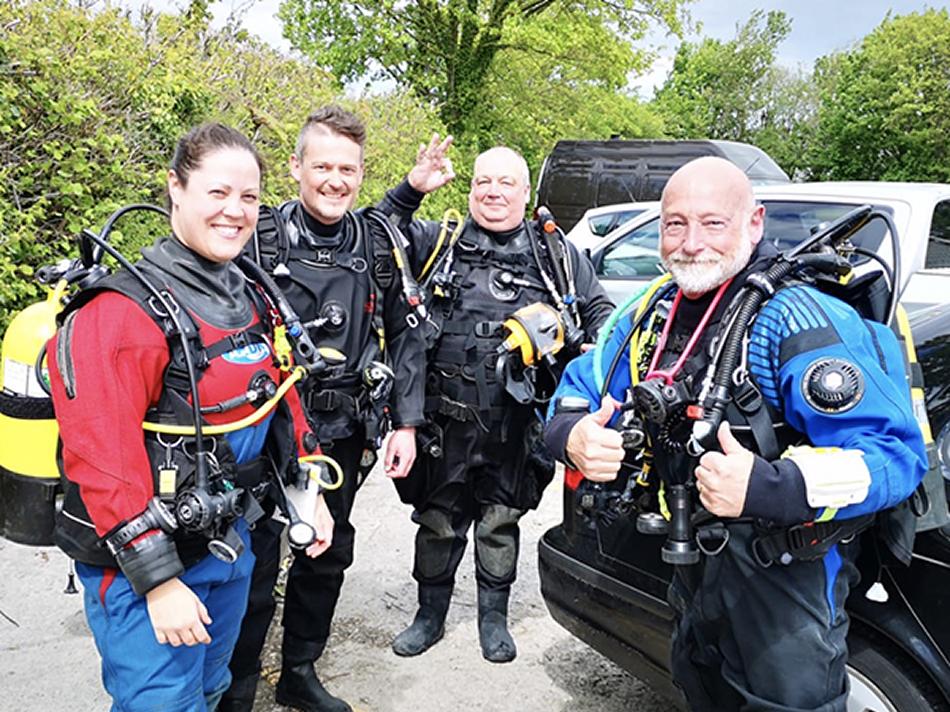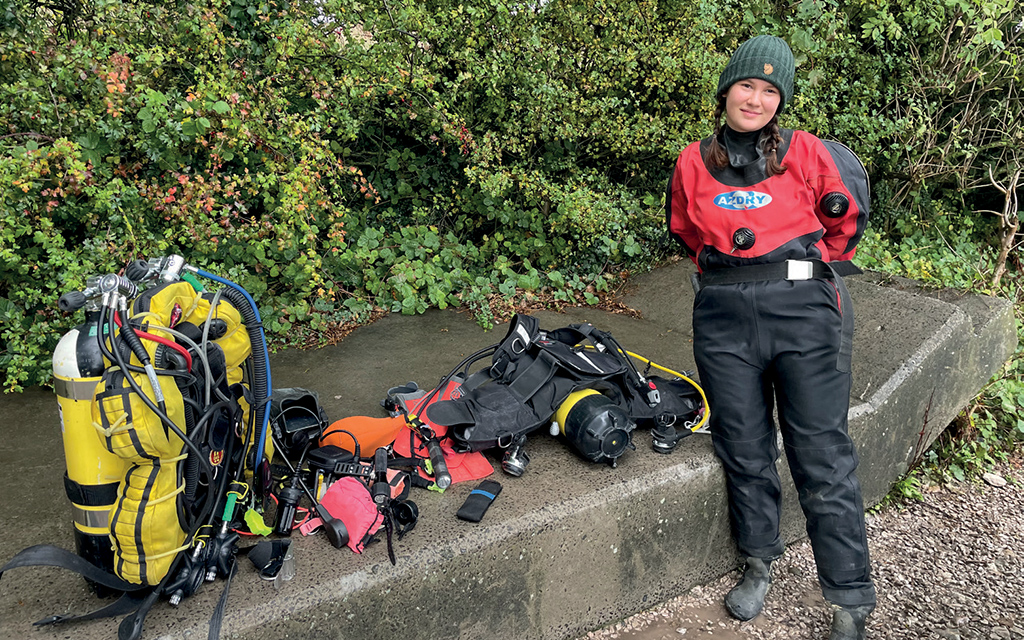
Wiktoria gets ready to dive - photo credit: LUSAC
Lancaster University Scuba Divers are working hard to reactivate their club post-Covid, and they would love a hand, please, from the wider BSAC community. Interview by Kristina Pedder.
LUScuba members are drawn in by many different things about diving; some love the experience and thrill of the underwater world, while others have a passion for marine life and are studying marine biology courses. The club runs training and keeps the costs low for students, but there isn’t enough experience to organise club dive trips outside the training programme. Maybe you can help?
Did the Covid pandemic affect the club?
Very much. We were down to only one paid-up member during Covid. But we attracted 25 members last year, mostly training for Ocean Diver. These are all new members; almost all old members had graduated. We’d love to get more staff and postgrads involved, but they often don’t know we exist, or don’t think they can join us because we’re a university society.
Who can join LUScuba?
Anyone. Students, staff, alumni, people outside the university are all welcome. In fact, we’d call on divers in our area to consider joining and supporting us. Any experienced divers and instructors will be very welcome among our ranks. If you’re an instructor who would love to help out a couple times, or if you have experience organising exciting dive trips and you’d like to pass on that knowledge, then please get in touch.
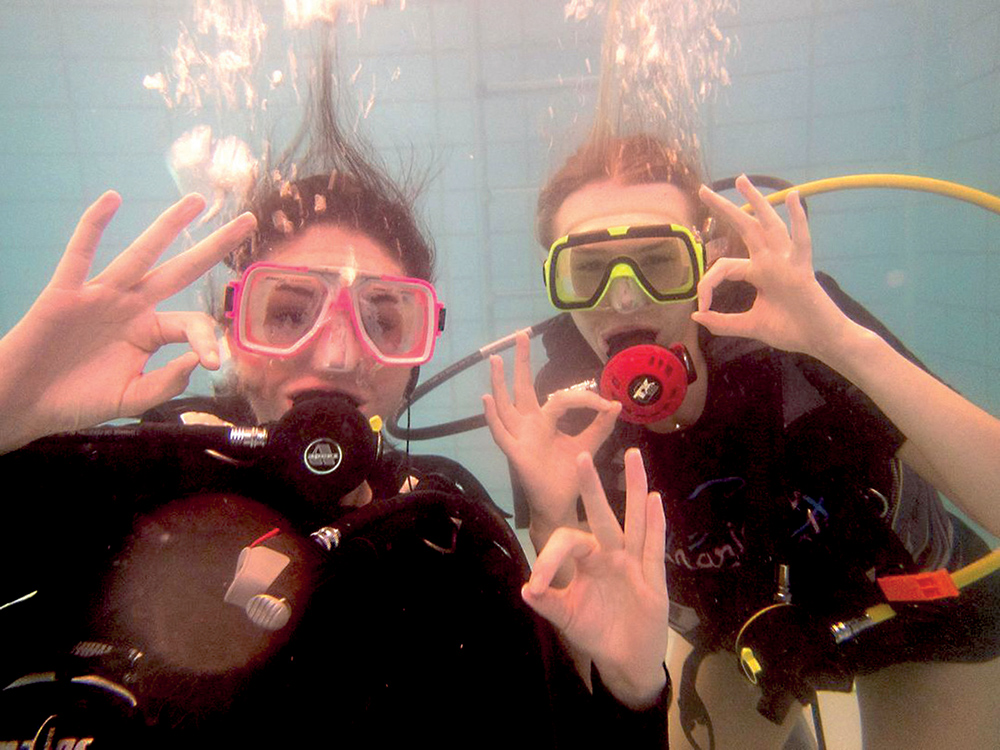
Pool training with the freshers at Lune Valley Swimming Pool
Who runs the club?
We now have a proper functioning executive; we have made our newest executive roles ‘Socials’ and ‘Publicity’ to help us get members together outside of diving, and to get our name out there. Everyone on the executive helps out, making sure the club is well run and able to function. Our members are mostly with us for a short time, staying three or four years for their degree and then moving on. There aren’t many students who stay in Lancaster after their degrees, so we completely lose them. At the moment we’re doing more diving than ever since Covid, and the club seems to be quite stable, so hopefully we can build on the past couple of years.
Who is your club’s unsung hero?
Neil Turton, our Diving Officer, who went to the uni a long while ago. He has always stuck around as an instructor for us, and he makes learning to dive really easy. He wants to get people in the water and diving, and his professional experience can help the rest of the committee focus on what’s next and how to improve the experience for members.
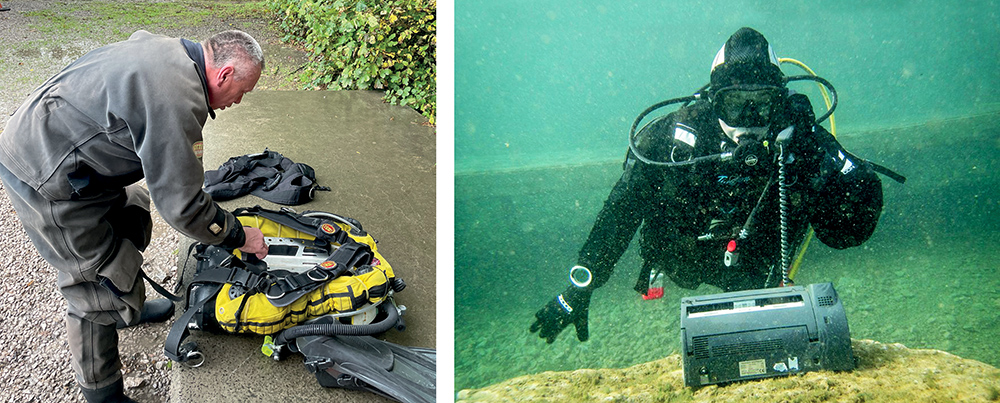
L-to-R: Diving Officer (and unsung hero) Neil Turton; answering the call at Capernwray
What was freshers’ fair like this year?
We had freshers’ fair in the autumn, and we have also just had re-freshers’ fair where we always hope to gain a few more divers. We had a really great freshers’ event; we took in our largest number of new members in a long time and we’re looking a lot healthier, but every year is different at a university. As in most years, the biggest interest was from new divers who want to get their qualifications, but we did have a couple of people join who are already PADI and SSI qualified.
Where do you meet?
We have a weekly social, quite a variety of formats from pub nights to bowling, to escape rooms. Hopefully something fun for everyone.
Where do you train?
Training is quite hard. We would like to use the university pool but there aren’t the time slots for us. We ask time and time again but the answer is no, so we hire Lune Valley Swimming Pool about 12 miles away in the village of Hornby-with-Farleton on demand instead. It’s a great pool but is quite a long distance to travel for most of our members.
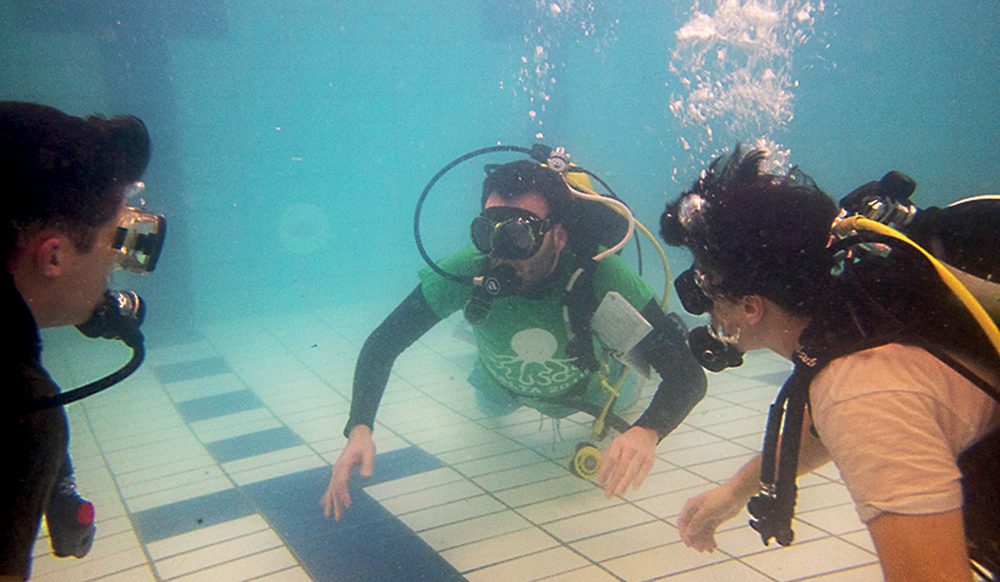
Scuba dive training at Lune Valley Swimming Pool
How many instructors do you have in the club?
We have one permanent instructor and two instructors who help us frequently, they are a mixture of Open Water Instructors and Practical Instructors.
How long does it take trainees to complete their Ocean Diver training?
It used to take an entire academic year to gain Ocean Diver, but we are hoping to make it twice as fast. We want to speed up the process with better club organisation and more instructors available to take open-water training. So far this academic year, we have completed pool training for everyone before Christmas. Open-water training is more difficult, as we like to have one-to-one instructors and trainees. It slows us down, but more instructors could mean we get people trained quicker.
Where does the club go for open-water training?
We are near Capernwray, which is a wonderful asset to have right on our doorstep.
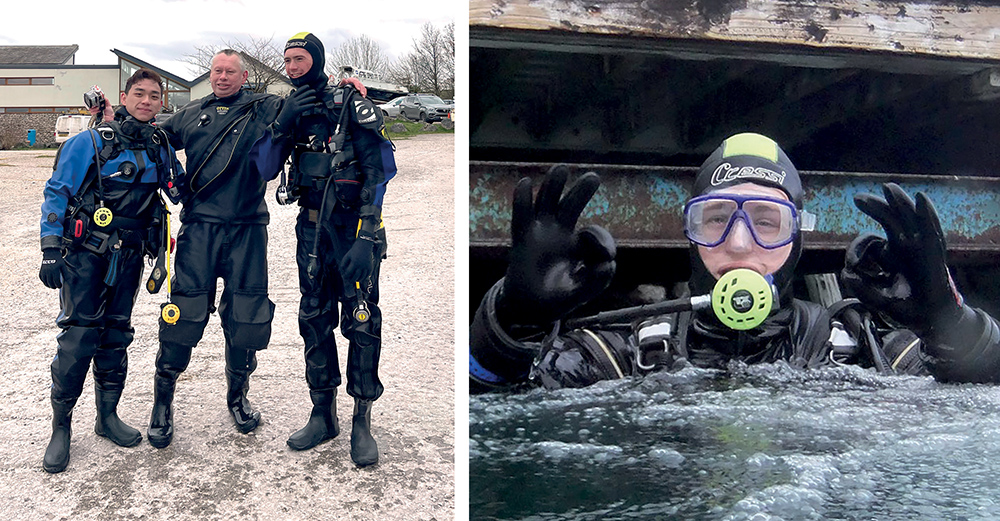
L-to-R: Vitto, Neil and Luca at Capernwray; Club President Stephen during Sports Diver training
What resources does the club have?
We have lots of club equipment, including drysuits, BCDs, tanks and regulators, fins. We have everything apart from gloves, they always get lost. Borrowing club kit is all included in our £45 membership fee.
What’s the arrangement with the student’s union?
We operate as a Lancaster University Students’ Union society, but the union doesn’t provide a lot. Some financial help would always be nice; grants are available, but we don’t get anything regular. It would also be nice if they helped us get some time to train in the university pool, instead of having to trek to Hornby, 12 miles away. The union promised to look into it, but the date for its report on this has been pushed back for at least a year and a half now.
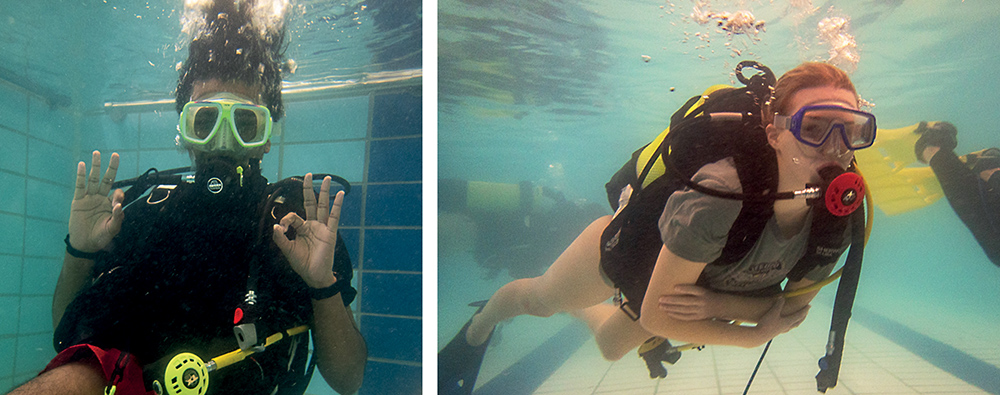
LUSAC offers affordable scuba diving for students in Lancaster
How do you keep diving costs down for students then?
Over the years we have built up a selection of kit, either donated or bought second hand. Servicing is done at our local dive shop, Morecambe Area Divers in Morecambe. Students can borrow all their scuba diving kit from the club, which saves having to buy it all from the get-go. Also, we have some great volunteer instructors who don’t charge us for expenses, which really keeps costs down. So, here’s a shout out to Neil Turton, Alistair Allen, John Power and Hannah Short. In the past we have also been helped by John Barton (now Yorkshire’s Regional Coach) Kerry Ekins (from York Uni) and Yasmine Thorn (BSAC’s University Coordinator). Neil also fixes drysuit seals himself, which really helps keep our costs for kit repair low and we haven’t got wet from his replacement seals yet. Even so, this year we had to raise our annual membership fee to £45, up from the £35 we kept it at for quite a few years.
What’s the club planning for the next few years?
We’d like to do a club dive trip (eventually). We’re planning a small joint trip with York University Sub Aqua Club to St. Abbs, to do some boat diving, but places on this are limited. We find it tricky to do bigger club dives because we don’t have the experience of diving and trip organising in the club. We would love for every member to have the opportunity to go on a big club dive, but without sufficient diving experience and transport to locations it’s a mammoth task that can be too much to handle when we are also studying.
Our Chair, Stephen Cook, who worked hard to get us back up and running after Covid, needs to hand over to someone new, as he is graduating. We also have a bit of a green agenda. We’re trying to be more environmentally friendly, avoiding printing out loads of paper posters and such. We occasionally support eco-societies on campus when they do litter picks, or similar events.
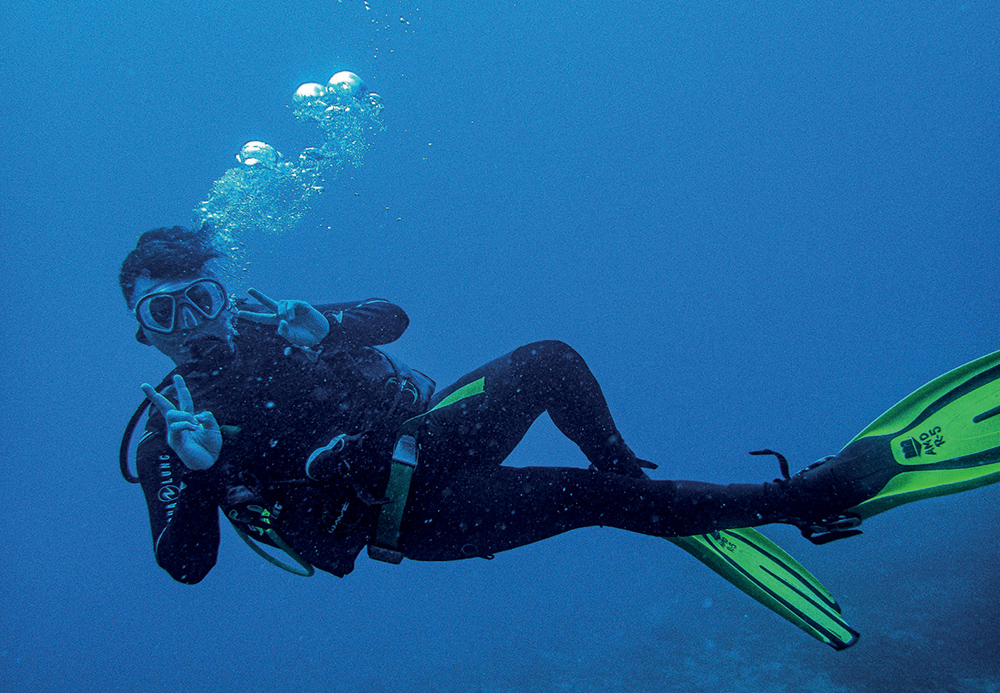
Vitto chilling out on a blue water diving holiday
Can BSAC divers help your club more?
Yes please! We always need more instructors and qualified divers to help us out. We hope to be interacting more with our new Regional Coach. Yasmine has been an amazing help recently, finding options for instructor training and putting us in contact with useful people. Our biggest stumbling block when it comes to getting new people trained is that we don’t always have the money to get qualified as instructors. The union doesn’t like paying for instructors; it can help with grants for equipment and ‘one time’ purchases, but doesn’t offer ongoing financial support. We have to keep costs down as much as we can, which includes getting trainers and instructors qualified, as well as the costs of Ocean Diver and Sports Diver qualifications. Students aren’t rich, so we can’t price them out, otherwise we risk losing the next generation.
We would like to see more diving cooperation between clubs (especially involving university clubs), as we often only have very new inexperienced members. This limits our choice of dive sites and our collective knowledge about organising dives. It’s great to have the opportunity to learn to dive at university, as prices are relatively low, and it is a time in life when you should try as many different experiences as possible.
How do I find scuba diving near me?
If you're looking to scuba dive in Lancashire with Lancaster University Scuba Divers, please contact Thomas Swallow.
Article by Kristina Pedder, first published in SCUBA magazine, Issue 134 April 2023.




